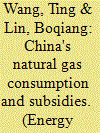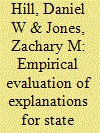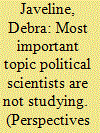|
|
|
Sort Order |
|
|
|
Items / Page
|
|
|
|
|
|
|
| Srl | Item |
| 1 |
ID:
127279


|
|
|
|
|
| Publication |
2014.
|
| Summary/Abstract |
China's natural gas consumption is growing rapidly and it has being driven by economic growth, industrialization and urbanization. In addition, the country's low-carbon development strategy, government-controlled gas price, and some other factors also contribute to the surging gas consumption. This paper studies China's natural gas consumption in residential, industrial and commercial sectors. We adopt the cointegration test and error correction model to study the relationships of explanatory factors and gas consumption of different sectors and climate factor is included into the analysis. In order to find the direction of natural gas pricing reform and establish the benchmark gas price, this paper also estimates the size of gas price subsidy by using price-gap approach. Our findings are as follows: In the long term, China's residential sector is more sensitive to price than the other two. Urbanization is an important factor promoting industrial and commercial gas consumption. Prices of other energies have an influence on natural gas consumption significantly due to the substitutability between energies. The slow-moving and unsatisfying pricing reforms on refined oil and natural gas lead to positive price elasticity of natural gas in the commercial sector, which implies that a further energy price reform is still stringent for China.
|
|
|
|
|
|
|
|
|
|
|
|
|
|
|
|
| 2 |
ID:
133949


|
|
|
|
|
| Publication |
2014.
|
| Summary/Abstract |
The empirical literature that examines cross-national patterns of state repression seeks to discover a set of political, economic, and social conditions that are consistently associated with government violations of human rights. Null hypothesis significance testing is the most common way of examining the relationship between repression and concepts of interest, but we argue that it is inadequate for this goal, and has produced potentially misleading results. To remedy this deficiency in the literature we use cross-validation and random forests to determine the predictive power of measures of concepts the literature identifies as important causes of repression. We find that few of these measures are able to substantially improve the predictive power of statistical models of repression. Further, the most studied concept in the literature, democratic political institutions, predicts certain kinds of repression much more accurately than others. We argue that this is due to conceptual and operational overlap between democracy and certain kinds of state repression. Finally, we argue that the impressive performance of certain features of domestic legal systems, as well as some economic and demographic factors, justifies a stronger focus on these concepts in future studies of repression.
|
|
|
|
|
|
|
|
|
|
|
|
|
|
|
|
| 3 |
ID:
127280


|
|
Financial analysis on the proposed renewable heat incentive for: a case study on the solar thermal system
/ Bakar, Siti Hawa Abu; Sukki, Firdaus Muhammad; Iniguez, Roberto Ramirez; Munir, Abu Bakar, Yasin, Siti Hajar Mohd, Mallick, Tapas Kumar, McLennan, Campbell, Rahim, Ruzairi Abdul
|

|
|
|
|
| Publication |
2014.
|
| Summary/Abstract |
This short communication paper focuses on the renewable heat incentive (RHI) scheme in the United Kingdom (UK); and in particular, on its implication on domestic installations of solar thermal systems (STSs). First, a short review on the STS in the UK is provided. Then, a detailed description of the RHI is discussed. A financial analysis is presented afterwards, analysing the impact of the RHI scheme on the applicants, in terms of the net present value and the internal rate of return. From the financial analysis it has been found that the RHI scheme for domestic installations is only attractive if a longer period of RHI payment, i.e. 17 years, or a higher RHI rate i.e. £0.32 per kW h is implemented. The current proposal from the UK government is not financially viable, and as a result, it may hinder the penetration of domestic solar thermal systems in the residential sector in the UK.
|
|
|
|
|
|
|
|
|
|
|
|
|
|
|
|
| 4 |
ID:
132977


|
|
|
|
|
| Publication |
2014.
|
| Summary/Abstract |
Surprise is an intrinsic fact of political life and its elimination, especially with regard to extraordinary moments of protest and revolution, is a vain endeavor. Prediction and explanation are fundamentally different enterprises. While scholars may be well-positioned to trace, retrospectively, the motivation, networks, leadership, and other contextual factors that fueled the events of 2011 and 1989, such analysis will never bestow the sort of predictive power that will eliminate the surprise of mass uprisings. Verstehen-esque studies of mobilization, while crucially enlightening, have limited capacity to augment our powers of foresight due to the fundamental gulf between agency and intention as well as the causal disconnect between precedent and prediction.
|
|
|
|
|
|
|
|
|
|
|
|
|
|
|
|
| 5 |
ID:
131658


|
|
|
| 6 |
ID:
127277


|
|
|
|
|
| Publication |
2014.
|
| Summary/Abstract |
Why do people sometimes refrain from saving energy even if it would pay off in monetary terms? Subjective discount rates present one possible explanation for this lack of foresight, but little is known about their level and reliability in the general population. With regard to behavior, persons with lower discount rates are expected to accept additional costs upfront more readily than those with higher discount rates. Based on a representative nation-wide study, the Swiss Environmental Survey 2007, and a follow-up survey, our analyses reveal that on average subjective discount rates are well above market interest rates and moderately stable over a time interval of four years. Income and education are negatively correlated with discount rates. Contrary to expectations, we did not find convincing support for an impact of discount rates on energy saving behavior.
|
|
|
|
|
|
|
|
|
|
|
|
|
|
|
|
|
|
|
|
|